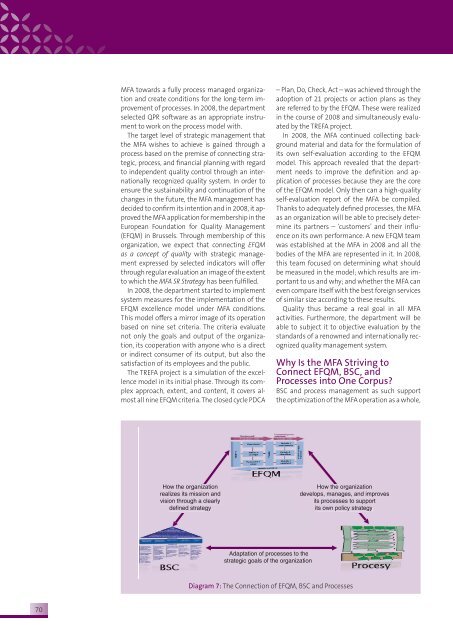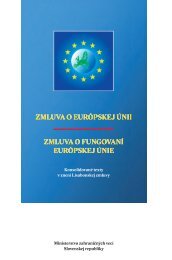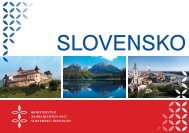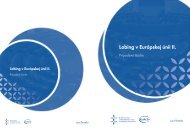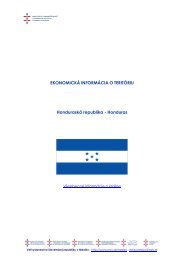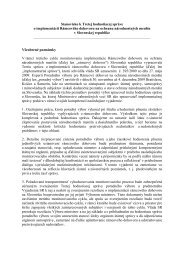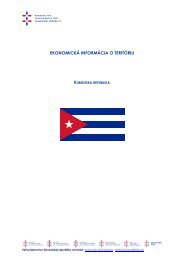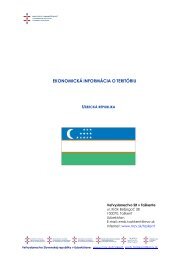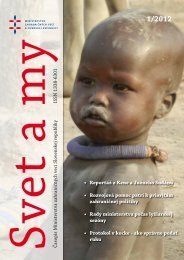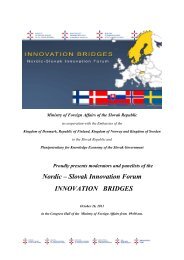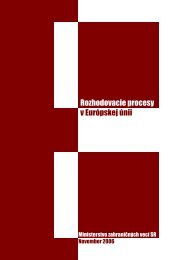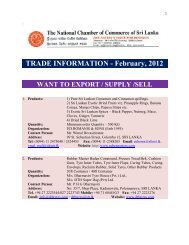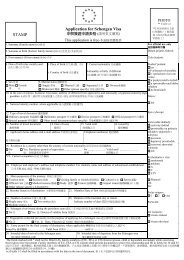Annual Report Ministry of Foreign Affairs of the Slovak Republic 2008
Annual Report Ministry of Foreign Affairs of the Slovak Republic 2008
Annual Report Ministry of Foreign Affairs of the Slovak Republic 2008
Create successful ePaper yourself
Turn your PDF publications into a flip-book with our unique Google optimized e-Paper software.
MFA towards a fully process managed organization<br />
and create conditions for <strong>the</strong> long-term improvement<br />
<strong>of</strong> processes. In <strong>2008</strong>, <strong>the</strong> department<br />
selected QPR s<strong>of</strong>tware as an appropriate instrument<br />
to work on <strong>the</strong> process model with.<br />
The target level <strong>of</strong> strategic management that<br />
<strong>the</strong> MFA wishes to achieve is gained through a<br />
process based on <strong>the</strong> premise <strong>of</strong> connecting strategic,<br />
process, and financial planning with regard<br />
to independent quality control through an internationally<br />
recognized quality system. In order to<br />
ensure <strong>the</strong> sustainability and continuation <strong>of</strong> <strong>the</strong><br />
changes in <strong>the</strong> future, <strong>the</strong> MFA management has<br />
decided to confirm its intention and in <strong>2008</strong>, it approved<br />
<strong>the</strong> MFA application for membership in <strong>the</strong><br />
European Foundation for Quality Management<br />
(EFQM) in Brussels. Through membership <strong>of</strong> this<br />
organization, we expect that connecting EFQM<br />
as a concept <strong>of</strong> quality with strategic management<br />
expressed by selected indicators will <strong>of</strong>fer<br />
through regular evaluation an image <strong>of</strong> <strong>the</strong> extent<br />
to which <strong>the</strong> MFA SR Strategy has been fulfilled.<br />
In <strong>2008</strong>, <strong>the</strong> department started to implement<br />
system measures for <strong>the</strong> implementation <strong>of</strong> <strong>the</strong><br />
EFQM excellence model under MFA conditions.<br />
This model <strong>of</strong>fers a mirror image <strong>of</strong> its operation<br />
based on nine set criteria. The criteria evaluate<br />
not only <strong>the</strong> goals and output <strong>of</strong> <strong>the</strong> organization,<br />
its cooperation with anyone who is a direct<br />
or indirect consumer <strong>of</strong> its output, but also <strong>the</strong><br />
satisfaction <strong>of</strong> its employees and <strong>the</strong> public.<br />
The TREFA project is a simulation <strong>of</strong> <strong>the</strong> excellence<br />
model in its initial phase. Through its complex<br />
approach, extent, and content, it covers almost<br />
all nine EFQM criteria. The closed cycle PDCA<br />
– Plan, Do, Check, Act – was achieved through <strong>the</strong><br />
adoption <strong>of</strong> 21 projects or action plans as <strong>the</strong>y<br />
are referred to by <strong>the</strong> EFQM. These were realized<br />
in <strong>the</strong> course <strong>of</strong> <strong>2008</strong> and simultaneously evaluated<br />
by <strong>the</strong> TREFA project.<br />
In <strong>2008</strong>, <strong>the</strong> MFA continued collecting background<br />
material and data for <strong>the</strong> formulation <strong>of</strong><br />
its own self-evaluation according to <strong>the</strong> EFQM<br />
model. This approach revealed that <strong>the</strong> department<br />
needs to improve <strong>the</strong> definition and application<br />
<strong>of</strong> processes because <strong>the</strong>y are <strong>the</strong> core<br />
<strong>of</strong> <strong>the</strong> EFQM model. Only <strong>the</strong>n can a high-quality<br />
self-evaluation report <strong>of</strong> <strong>the</strong> MFA be compiled.<br />
Thanks to adequately defined processes, <strong>the</strong> MFA<br />
as an organization will be able to precisely determine<br />
its partners – ‘customers’ and <strong>the</strong>ir influence<br />
on its own performance. A new EFQM team<br />
was established at <strong>the</strong> MFA in <strong>2008</strong> and all <strong>the</strong><br />
bodies <strong>of</strong> <strong>the</strong> MFA are represented in it. In <strong>2008</strong>,<br />
this team focused on determining what should<br />
be measured in <strong>the</strong> model; which results are important<br />
to us and why; and whe<strong>the</strong>r <strong>the</strong> MFA can<br />
even compare itself with <strong>the</strong> best foreign services<br />
<strong>of</strong> similar size according to <strong>the</strong>se results.<br />
Quality thus became a real goal in all MFA<br />
activities. Fur<strong>the</strong>rmore, <strong>the</strong> department will be<br />
able to subject it to objective evaluation by <strong>the</strong><br />
standards <strong>of</strong> a renowned and internationally recognized<br />
quality management system.<br />
Why Is <strong>the</strong> MFA Striving to<br />
Connect EFQM, BSC, and<br />
Processes into One Corpus?<br />
BSC and process management as such support<br />
<strong>the</strong> optimization <strong>of</strong> <strong>the</strong> MFA operation as a whole,<br />
How <strong>the</strong> organization<br />
realizes its mission and<br />
vision through a clearly<br />
defined strategy<br />
How <strong>the</strong> organization<br />
develops, manages, and improves<br />
its processes to support<br />
its own policy strategy<br />
Diagram 7: The Connection <strong>of</strong> EFQM, BSC and Processes<br />
70


